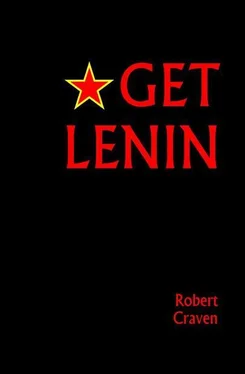Robert Craven - Get Lenin
Здесь есть возможность читать онлайн «Robert Craven - Get Lenin» весь текст электронной книги совершенно бесплатно (целиком полную версию без сокращений). В некоторых случаях можно слушать аудио, скачать через торрент в формате fb2 и присутствует краткое содержание. Жанр: Триллер, на английском языке. Описание произведения, (предисловие) а так же отзывы посетителей доступны на портале библиотеки ЛибКат.
- Название:Get Lenin
- Автор:
- Жанр:
- Год:неизвестен
- ISBN:нет данных
- Рейтинг книги:3 / 5. Голосов: 1
-
Избранное:Добавить в избранное
- Отзывы:
-
Ваша оценка:
- 60
- 1
- 2
- 3
- 4
- 5
Get Lenin: краткое содержание, описание и аннотация
Предлагаем к чтению аннотацию, описание, краткое содержание или предисловие (зависит от того, что написал сам автор книги «Get Lenin»). Если вы не нашли необходимую информацию о книге — напишите в комментариях, мы постараемся отыскать её.
Get Lenin — читать онлайн бесплатно полную книгу (весь текст) целиком
Ниже представлен текст книги, разбитый по страницам. Система сохранения места последней прочитанной страницы, позволяет с удобством читать онлайн бесплатно книгу «Get Lenin», без необходимости каждый раз заново искать на чём Вы остановились. Поставьте закладку, и сможете в любой момент перейти на страницу, на которой закончили чтение.
Интервал:
Закладка:
The next day, Eva was summoned to Jonas’ family home, a comfortable middle-class dwelling that to Eva had been always filled with laughter. As she stepped over the threshold she felt the pall that had descended throughout the house.
Christian Zamoyski seemed to almost look through her as he held his arm out before her. ‘Good afternoon, Eva. Please step into my study,’
The room was dimly lit. Somewhere in a room above a woman was keening. Occasional sounds rang out, followed by cries. Christian had somehow shrunk in stature. An ill-fitting jacket seemed to flap about him on a hidden breeze. With a sigh he slumped into the chair behind a large desk and from a drawer he produced a cheque book. He scratched across it with a pen to the slow tick of the grandfather clock in the gloom. ‘Thank you for bringing him safely to the border, Eva.’ He handed her the cheque. It was twice the value of her engagement ring.
‘Thank you, Mr. Zamoyski,’ she stammered with tears pinching the corners of her eyelids, ‘this is too much.’
‘The family are waiting for you in the kitchen,’ Christian whispered as he rose unsteadily. Sighing deeply, he seemed to lose some more of his body mass as he walked toward the door. He guided her through the hall, past the staircase where she and Jonas had chased each other as children, past the cellar door where they had enjoyed their first kiss, and into the kitchen.
Zoya sat motionless at the table. Behind her, standing in rigid attention, was the family. Her voice broke several times and rose in register as she spoke to Eva. ‘You are never to call, never to visit the grave, never to contact us for any reason again. Never, ever again.’ Jonas’ brothers and sisters all stood stone-faced and unresponsive to Eva’s pleas.
‘Vidma!’ hissed Zoya, crossing herself three times, her rosary beads rattling in her thin white fist, her ferocity silencing Eva.
Eva left the house, her world spinning. These people, who had welcomed her, now sent her away vilified. She was an outcast from the family that had adopted her since she was thirteen. Vidma , a witch — that wounded her deeply.
She returned to her grandparents' house on the outskirts of the city. Henk stood at the doorway and held her close as she wept. This was now the third tragedy within a year: Henk and Aga losing a son, then a daughter-in-law, and now Jonas, the bright lad who dreamed of being an actor. It was almost too much for the three of them to bear.
Something became numb, dead and lifeless inside Eva. All she could see was a creeping darkness. It started at the edges of her vision, peripheral shadows drawing in closer like curtains. She thought at first it was a trick of the light as she brushed her hair first thing in the morning. The mirror on her dresser seemed to have developed a smoky frame.
Her weight dropped and Grandmother Aga fretted. ‘Eat, child, eat,’ she’d whisper into her ear as she placed warm soup and bread on the table, tutting quietly later as she’d take back the untouched food while maintaining a silent perseverance. Any morsel consumed was viewed as a victory.
Before his retirement Henk had lectured English and Classic Philosophy at the Jan Matejko Academy in Krakow. He managed to secure a librarian’s assistant position for Eva there.
Amid the Trappist-quiet halls, Eva began her gradual recuperation. She hid amid shapeless clothes and a plain brown head scarf. She never made eye contact. She sought sanctuary in the library’s books. Drawn to languages, she immersed herself in books alone in her bedroom at night. Henk and Aga began to help her, his natural ear for language beginning to build a bridge to his broken granddaughter. Aga’s German, stilted and guttural, gave Eva a feel for a language. She could sometimes guess ahead of her grandmother what the next sentence was going to be.
For the first time in her life she entered her grandfather’s library, to her simply a vast oaken door secured by a Gothic black lock while she was growing up. Beyond the door stood high bookcases, beautifully fashioned in mahogany, containing wall-to-wall leather-bound volumes accessed with the help of a sliding ladder.
Henk touched her shoulder, the reassurance and strength flowing from his digits into her soul. ‘Stay in here as long as you want, Eva.’ His voice was gentle and mellow, his Polish still carrying a Dutch cadence. It had made her laugh as a child. She loved its sound; it reminded her somehow of treacle.
She whiled away the autumn and winter months there. Henk procured a large well-worn leather armchair for her to coil up in. She read by the firelight. Aga would leave food and tea for her, stepping in quietly and touching Eva’s arm gently, as silent as a ghost.
Henk moved in the piano, a family heirloom, upright and ornately inlaid with delicate flowers, and Eva discovered old studies she’d learned as a child. All the manuscripts of sheet music Eva uncovered were dusted down for her. Sitting at the stool, she set the old wooden metronome and began to learn how to play again. She would lose herself for hours in the music of Johan Sebastian Bach, beginning with the Anna Magdalena notebook.
Slowly as a flower buds, Eva’s soul began to heal.
The following spring semester brought Theo Kassinski. He was tall and lean. Dark curls flowed around his handsome features and he had an innate assurance of his place in the world. He was an unkempt, handsome artist with a smile for her every time he came up to borrow a book. He was looking for a model to draw and he guessed correctly that under her shapeless clothes Eva was a goddess. He asked her to model for him, assuring her he wasn’t interested in her other than her being his contract model. At the desk he had scratched out a quick pencil sketch of her to prove that he could draw. She merely glanced at the sketch — it didn’t move her in any particular way — and agreed with the briefest of nods. On the back of the page he wrote out the address of his studio and handed it to her.
That Saturday she went to the address. The studio, a reconditioned garret above a warehouse, contained a cold water sink, a brass bed and basic kitchenette. Trestle tables lined the far wall with the paraphernalia of his vocation. The room had a co-ordinated chaos about it, where food, drink and clothing lay piled amid oils, canvas, brushes, reams of paper and sheets of hardboard. A screen covered an ornate ancient commode, though rarely as their relationship developed did they avail themselves of it, preferring to take a break at the small cafe across the road, Theo more often than not dappled from head to toe in paint.
She disrobed in the spring sunshine in his studio, moving in poses as Theo sketched her quickly. Both subject and artist took a dispassionate view of each other, and yet Eva found herself every weekend in the studio. They were alone for hours on end, the scratching of pencil, charcoals and pastels marked by the passage of the sun across the wooden floor, the easel a barrier between them.
She allowed her mind to close. Every breath was measured, timed — sometimes short, other times for as long as her lungs would allow. She started to push the limits of her body, twisting herself into complex poses, this breathing exercise making her focus her concentration on the pose relishing, the challenge it presented. A subtle chemistry developed between them where she could almost guess what he was going to ask next. At the end of each session, he would proudly display his renderings as he turned the easel around to her.
For Theo, this arrangement was perfect. Eva never uttered a word, nor sighed, nor complained about having to stand still. He was a rich, bored scion of a local clothing factory owner, though he showed real potential according to some of the gallery owners he had shown his work to. He was Jewish, and always at odds with his father for not attending synagogue and eschewing his heritage and studies. They didn’t square with his chosen nihilistic existence. He would tell her this from behind the easel, usually when he was struggling with his materials. It eased the tension within him. Other than his clashes with his father, she learned he was an only child like her and devoted to his mother.
Читать дальшеИнтервал:
Закладка:
Похожие книги на «Get Lenin»
Представляем Вашему вниманию похожие книги на «Get Lenin» списком для выбора. Мы отобрали схожую по названию и смыслу литературу в надежде предоставить читателям больше вариантов отыскать новые, интересные, ещё непрочитанные произведения.
Обсуждение, отзывы о книге «Get Lenin» и просто собственные мнения читателей. Оставьте ваши комментарии, напишите, что Вы думаете о произведении, его смысле или главных героях. Укажите что конкретно понравилось, а что нет, и почему Вы так считаете.











